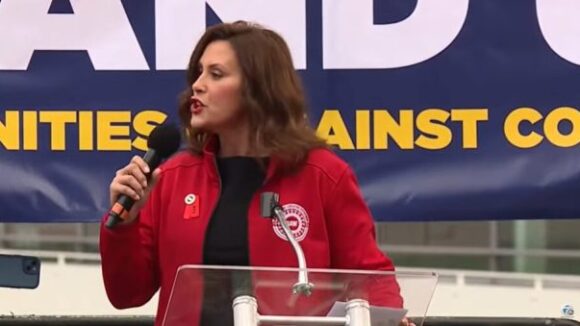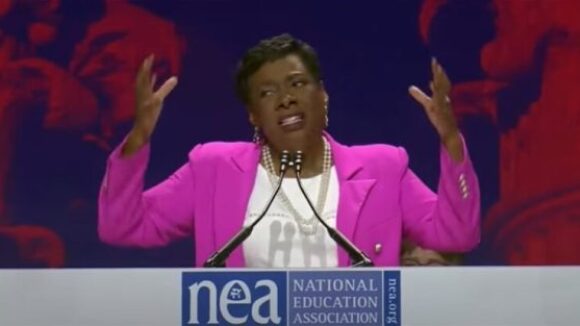Tyranny Triumphs in the Great Lakes State
Ignoring ample evidence of forced unionism’s unfairness and its damaging impact on jobs and incomes, Big Labor Michigan Gov. Gretchen Whitmer signed Right to Work destruction in 2023.


Just a few short years ago, Big Labor bosses were licking their chops over the prospect of destroying Virginia’s Right to Work law, which has been on the books since 1947.
The stage for Right to Work destruction seemed to be set in March 2020, as union-label Democrat politicians rammed through repeal of Virginia’s 27-year-old statutory ban on government-sector monopoly bargaining.
This scheme, signed into law by then-Gov. Ralph Northam (D), allowed union bosses to seize additional power over taxpayers and reign supreme over K-12 teachers and other civil servants.
But just 20 months later, in November 2021, the Old Dominion’s voters turned the tables on union bigwigs and their puppet politicians.
Businessman Glenn Youngkin (R) shocked many pundits by winning the governorship on a platform opposing public-sector monopoly bargaining for Big Labor. Meanwhile, Mr. Youngkin’s party took over the state House of Delegates.
Unfortunately, the Virginia Senate was not up for election in 2021. Naturally, Big Labor’s control over that chamber continues unabated.
In 2022, the House adopted legislation (H.B.883) to reinstate Virginia’s ban on public-sector monopoly bargaining and repeal other union special-interest legislation adopted in 2020. But the
Senate unceremoniously killed the House bill in committee.
These votes have ushered in a Virginia election season where the dividing lines on Big Labor’s influence in state and local government have never been clearer. As of now, any state Democrat attempting to run for office must pay fealty to the union bosses or face a barrage of hostile spending and left-wing activism in a primary. Consequently, Right to Work support has almost disappeared among Democrat politicians, even as Republicans increasingly rely on this issue to court voters.
After an eventful primary season, a cavalcade of seats in both chambers are being contested in the first elections since post-pandemic redistricting was completed. These include about a dozen races in the House and a handful in the Senate that will determine who controls each chamber.
The key races are spread out among the three major metropolitan areas of the Commonwealth.
Given the stakes involved, the National Right to Work Committee’s candidate survey and citizen mobilization program is of course in high gear.
One House race worth highlighting is in the northwest Richmond suburbs.
There, pro-Right to Work Republican home builder David Owen is running against Big Labor-endorsed Democrat Susanna Gibson. It is likely over a million dollars in reported contributions alone will be poured into this race.
One key Senate race targeted by Right to Work’s Survey 2023 is in Loudoun County, a western D.C. suburb. There, first-time Republican candidate Juan Pablo Segura has pledged full Right to Work support and is going head-to-head with Big Labor-endorsed Russet Perry.
This is a Joe Biden-supporting district that swung 13 points to back Mr. Youngkin two years ago. Union officials are pouring money and manpower into this contest.
Another knife-edge Senate race is unfolding north of Newport News, where survey signatory and Republican York County Sheriff Danny Diggs is running against incumbent Democrat Sen. Monty Mason. Mr. Mason was one of the 12 Big Labor senators who voted to kill H.B.883 in committee last year. Not surprisingly, union operatives are making enormous, mostly unreported expenditures to protect him.
Right to Work Vice President John Kalb commented:
“Up to now, thanks in part to the Committee’s effective lobbying of local elected officials, deals between cities, counties and towns and union bosses handing Big Labor monopoly-bargaining power over the terms and conditions of employment for civil servants haven’t spread to too many Virginia communities.
“Recently, Portsmouth became the first locality in Hampton Roads to foist union-boss rule on its employees, following the example of Richmond and several others near Washington, D.C.
“But as time progresses, freedom-loving citizens’ ability to curtail the expansion of monopolistic unionism will shrink due to ‘normalization,’ just like with any other Big Government scheme.
“Virginians must act this year to stop monopoly bargaining in its tracks, or repeal will become much more difficult in the future. With the Committee’s citizen mobilization program, we have confidence the stage can be set for repeal of Virginia’s anti-individual employee, anti-taxpayer monopoly-bargaining statute this November.”
This article was originally published in our monthly newsletter. Go here to access previous newsletter posts.
To support our cause and help end forced unionism, go here to donate.

Ignoring ample evidence of forced unionism’s unfairness and its damaging impact on jobs and incomes, Big Labor Michigan Gov. Gretchen Whitmer signed Right to Work destruction in 2023.

Largely thanks to the Right to Work attorney-won U.S. Supreme Court decision in Janus v. AFSCME, union bosses like NEA President Becky Pringle are no longer able to block virtually all meaningful education policy reforms.

Avelo employee Kim Howard believes all the firm’s flight attendants should get to vote on continued AFA rule. Credit: WTNH-TV (ABC,…